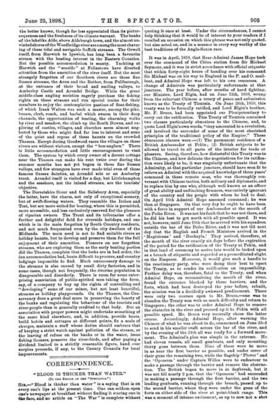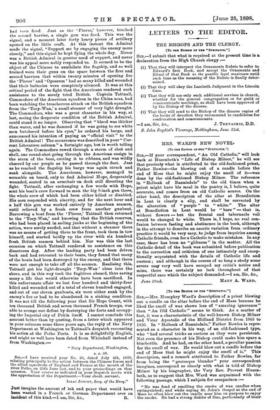CORRESPONDENCE.
"BLOOD IS THICKER THAN WATER." (To TR! EDITOR or MR "SPICIATOR...] SIE,•••-•" Blood is thicker than water" is a saying that is on every one's lips at the present time. One can seldom open one's newspaper at breakfast without finding it staring one in ' tile face, and no article on " The War " is complete without ,
quoting it once at least. Under the circumstances, I cannot help thinking that it would be of interest to your readers if I recalled an occasion on which this phrase was not only quoted, but also acted on, and in a manner in every way worthy of the best traditions of the Anglo-Saxon race.
It was in April, 1859, that Rear-Admiral James Hope took over the command of the China station from Sir Michael Seymour, and it was in strict accordance with official etiquette that within forty-eight hours of handing over his command Sir Michael was on his way to England in the P. and 0. mail- boat, and Admiral Hope was left to his own resources. A change of Admirals was particularly unfortunate at that juncture. The year before, after months of hard fighting, I our Minister, Lord Elgin, had on Jane 12th, 1858, wrung from the reluctant Chinese a treaty of peace and submission known as the Treaty of Tientain. On June 26th, 1859, this treaty was to be formally ratified, and Lord Elgin's brother, Mr. F. Bruce, had been appointed our Plenipotentiary to carry out the ratification. This Treaty of Tientsin contained two clauses particularly obnoxious to the Chinese, and, to quote Lord Elgin's own words, "they amounted to a revolution, and involved the surrender of some of the most cherished principles of the traditional policy of the Empire." These obnoxious clauses were :—(1) The permanent residence of a British Ambassador at Pekin ; (2) British subjects to be allowed to travel to all parte of the interior for trade or pleasure. Seeing, therefore, how distasteful this Treaty was to the Chinese, and how delicate the negotiations for its ratifica- tion were likely to be, it was singularly unfortunate that the Admiralty, at that particular juncture, should have seen fit to relieve an Admiral with the acquired knowledge of three years' command in those remote seas, who was thoroughly con- versant with Chinese tactics, both military and diplomatic, and to replace him by one who, although well known as an officer of great ability and unflinching firmness, was entirely ignorant of the country and the people with whom he had to deal. On April 16th Admiral Hope assumed command ; he was then at Singapore. On that very day he ought to have been with a force in support of our Ambassador at the mouth of the Peiho River. It was not his fault that he was not there, and he did his best to get north with all possible speed. It was not, however, until June 19th that he arrived with his squadron outside the bar of the Peiho River, and it was not till next day that the English and French Ministers arrived in the Magicienne ' and ' Duchayla.' They arrived, therefore, at the mouth of the river exactly six days before the expiration of the period for the ratification of the Treaty at Pekin, and in that land of ceremony to arrive late would be looked upon as a breach of etiquette and regarded as a premeditated slight on the Emperor. Moreover, it would give such a handle to the reactionary party, who were doing their best to upset the Treaty, as to render its ratification an impossibility. Further delay was, therefore, fatal to the Treaty, and when Admiral Hope, on reconnoitring the mouth of the river, found the entrance blocked by three barriers, and the forts, which had been destroyed the year before, rebuilt, the mission was in a decidedly awkward predicament. There were only two courses open to Mr. Bruce,—one was to abandon the Treaty won with so much difficulty and return to Singapore ; the other was to order Admiral Hope to remove the obstacles in the river and proceed up it to Pekin with all possible speed. Mr. Bruce very naturally chose the latter course. Accordingly, Admiral Hope, after warning the Chinese of what he was about to do, commenced on June 23rd to send in his smaller craft across the bar of the river, and by the evening of the 24th all was ready for a forward move- ment. The Admiral's plan was simple in the extreme. He had eleven vessels, all small gunboats, and only mounting thirty guns between them. Nine of these were to move in as near the first barrier as possible, and under cover of their guns the remaining two, while the flagship ' Plover' and the ' Opossum' under Captain Willes were to endeavour to make a passage through the barrier and remove the obstruc- tion. The British began to move in at daybreak, but it was not till nearly 2 p.m. that the ' Opossum' had succeeded in making a passage through the first barrier, and the two leading gunboats, running through the breach, passed .up to the second barrier, where they were under the guns of the forts on either side of the river at point-blank range. This was a moment of intense excitement, as up to now not a shot
had been fired. Just as the Plover,' however, touched the second barrier, a single gun was fired. This was the signal, and a moment later forty heavy pieces of artillery opened on the little craft. At this instant the Admiral made the signal, "Support me by engaging the enemy more closely," and this signal be kept flying the whole day. Never was a British Admiral in greater need of support, and never was his appeal more nobly responded to. It seemed to be the object of the Chinese to annihilate the flagship, and so well trained were their guns on the space between the first and second barriers that within twenty minutes of opening fire the Plover' and Opossum' had so many killed and wounded that their batteries were completely silenced. It was at this critical period of the fight that the Americans rendered such assistance to the sorely tried British. Captain Tattnall, Commodore of the American squadron in the China seas, had been watching the treacherous attack on the British squadron from the ' Toey-Wan,' a small steamer of very light draught. The Commodore, who was a great character in his way, at last, seeing the desperate condition of the British Admiral, could stand it no longer. Observing that " blood was thicker than water, and he was damned if he was going to see white men butchered before his eyes," he ordered his barge, and announced his intention of paying an " official visit " to the British Admiral ! The occurrence was described in your " Cur- rent Literature column" a fortnight ago, but is worth telling again. The Commodore rowed through a storm of shot and shell, one round-shot going through the American ensign in the stern of the boat, cutting it to ribbons, and was wildly cheered by our people as he passed through the fleet. Just as he reached the flagship hie barge was again struck and sank alongside. The Americans, however, managed to scramble on board, only to find Admiral Hope, desperately wounded, seated in an armchair on deck still directing the fight. Tattnall, after exchanging a few words with Hope, sent his boat's crew forward to man the big 8-inch gun there, the whole crew of which had been either killed or disabled. His men responded with alacrity, and for the next hour and a half this gun was worked entirely by American seamen, until relieved by a fresh crew from another gunboat. Borrowing a boat from the Plover,' Tattnall then returned to the Toey-Wan,' and knowing that the British reserves, who had been placed in sailing junks at the beginning of the action, were sorely needed, and that without a steamer there was no means of getting them to the front, took them in tow himself, and started boldly up the river with six hundred fresh British seamen behind him. Nor was this the last occasion on which Tattnall rendered us assistance on this disastrous day. After the landing party had been driven back and had retreated to their boats, they found that many of the boats had been destroyed by the enemy, and that there were not enough to take off all the seamen. Realising this, Tattnall got his light-draught Toey-Wan ' close into the shore, and in this way took the fugitives aboard, thus saving many a life that would otherwise have been sacrificed. In this unfortunate affair we lost four hundred and thirty-four killed and wounded out of a total of eleven hundred engaged, and out of our eleven gunboats, six were either sunk by the enemy's fire or had to be abandoned in a sinking condition. It was not till the following year that Sir Hope Grant, with ten thousand British and seven thousand French troops, was able to avenge our defeat by destroying the forts and occupy- ing the Imperial city of Pekin itself. I cannot conclude this account better than by quoting, from a letter which appeared in your columns some three years ago, the reply of the Navy Department at Washington to Tattnall's despatch recounting his action at the Peiho Forts. It is so delightfully English,
and might so well have been dated from Whitehall instead of from Washington :—
" Navy Department, Washington,
s. z. 59.
have received your No. 36, dated July 4th, 1859, relating principally to the action between the Chinese forces and the allied squadrons of England and France at the mouth of the river Peiho, on 25th June last, and to your proceedings on that occasion. Your course as indicated in your dispatch meets with the approbation of the Department.—Your obedt. servant.
ISAAC JONCET, Secy. of the Navy." Just imagine the amount of ink and paper that would have been wasted in a French or German Department over an incident of this kind.—I am, Sir, Szc.. R.



















































 Previous page
Previous page